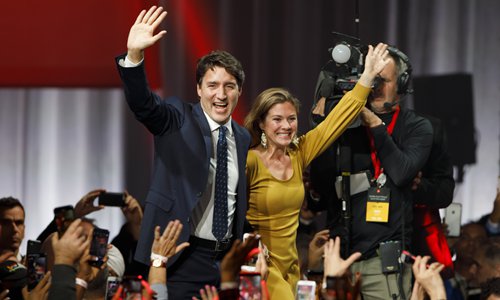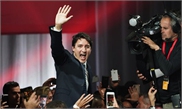
Canadian Prime Minister Justin Trudeau holds his wife Sophie Grégoire Trudeau's hand and waves at the Palais des Congres in Montreal during Team Justin Trudeau 2019 election night event in Montreal, Canada on Tuesday. Trudeau's Liberal Party held onto power in a nail-biter of a Canadian general election on Monday. Photo: AFP
Canadian Prime Minister Justin Trudeau securing his post is relatively better news for China-Canada relations but the hope for warming ties remains dim, Chinese analysts noted.
Trudeau will form a minority government after a tough election battle with the Conservative Party led by Andrew Scheer, media reported.
The analysts said the narrow victory might be "better news" than Scheer winning, but Trudeau appeared to lack the boldness or space to maneuver China-Canada relations out of the current deadlock.
Xia Guohan, a Beijing-based research fellow with Chinese think tank the Grandview Institution, said that Liberals, in contrast to the Conservatives led by Scheer, embrace more multilateralism, diversification of foreign trade and global cooperation in addressing climate change.
"If Scheer had won, Canada would have almost certainly swung to the US in diplomacy considering the Conservatives have been advocating stronger ties with traditional allies,"Xia said.
Scheer is known for his hard-line stance on China. He had suggested that Canada withdraw from the China-initiated multilateral Asian Infrastructure Investment Bank and launch a complaint against China in the World Trade Organization. He had also expressed strong support for Hong Kong riots on Twitter.
Xia stressed that Trudeau had the incentive to restore China-Canada relations, but that would be difficult as Ottawa faces pressure from Washington.
Progress in China-US trade talks may grant Trudeau a bit of space, but the detention of Huawei chief financial executive Meng Wanzhou stood in the way, he said.
China-Canada relations plunged to freezing point after Canadian police in December 2018 detained Meng at an airport on the extradition request of the US.
Chinese analysts believe the move to be part of the US President Donald Trump administration's strategy to contain Huawei and China's technology industry.
They have urged Canada to keep its legal system independent and make decisions beneficial to itself rather than be duped by other countries.
Some Canadians have expressed misgivings about the US role in the dispute.
"Many Canadians have felt that the US has thrown Canada under the 'anti-China, cold war' bus with the Meng [Wanzhou] arrest," Paul Evans, professor at the public policy and global affairs school of University of British Columbia in Vancouver, was quoted as saying by CNBC.
The Canadian government continues to officially assert that its judicial system remains independent of politics.
But Foreign Affairs Minister Chrystia Freeland told CBC's Ottawa Morning "Saying you're a rule of law country doesn't mean political decisions don't get taken."
Meng's case has entered lengthy legal procedures in Canada, which could last years: basically a deadlock and Trudeau needs to find a step down, Xia said.
Geng Shuang, Chinese Foreign Ministry spokesperson, has urged the Canadian side to reflect upon its mistakes for difficulties in bilateral relations, saying it should treat China's solemn position and concerns seriously and immediately release Meng.

